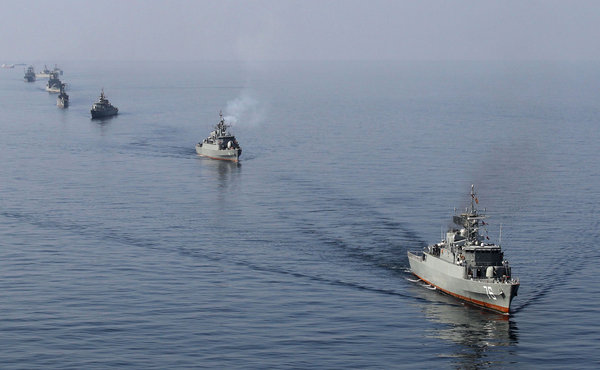While Iran is threatening to block the Straits of Hormuz, and various agents are calling for military actions, the crew of an American destroyer patrolling the North Arabian Sea rescued 13 Iranian fishermen captured by Somali pirates in November, 2011. U.S. Navy Rescues Iranians Held by Pirates, 1/6/12, Robert Mackey and J. David Goodman. The article quotes one of the rescued fishermen, Fazel Ur Rehman, 28, “It is like you were sent by God. Every night we prayed for God to rescue us. And now you are here.”
Asian Customers of Iran Look for Other Oil Sources, 1/7/12, Keith Bradsher and Clifford Krauss,
In Bold Step, Europe Nears Embargo on Iran Oil, 1/5/12, Steven Erlander,
Iran Warns the United States Over Aircraft Carrier, 1/4/12, J. David Goodman,
Oil Price Would Skyrocket if Iran Closed the Strait of Hormuz, 1/5/12, Clifford Krauss,
Noise Level Rises Over Iran Threat to Close Strait of Hormuz, 12/29/11, Rick Gladstone,
Oil Prices Predicted to Remain Above $100 a Barrel Next Year, 12/29/11, Diane Cardwell and Rick Gladstone, Lawrence J. Furman, at Popular Logistics, forecast, “The Price of oil will be at $150 to $170 per barrel in Dec., 2012. The price of gasoline will hit $6.00 per gallon in NYC and California.”
Iran Calls Threat of Sacntions from European Union ‘Economic War’, 12/29/11, J. David Goodman,
Iran Threatens to Block Oil in Reply to Sanctions, 12/28/11, David E. Sanger and Anne Lowrey,
Iran Admits Sanctions are Inflicting Damage, 12/20/11, Rick Gladstone,
Given the implications of petroleum shortages and/or price spikes, current tensions with Iran are a serious matter, entirely aside from one’s opinions about Iranian government’s behavior. We note that in preparing a piece about the possibility of Iran attempting to limit world petroleum supplies, a search of the The Times for “+Iran +Oil” yields no less than ten pieces of reporting. We see our role, at Popular Logistics, as framing and interpreting what is going on. We strive to be primary sources of understanding while second-hand sources of news, especially in foreign theaters such as the Middle East, Europe and Asia. We rely on The New York Times, WNYC (our local NPR affiliate), the World Factbook of the CIA, and other agencies of the United States Government, the WorldWatch Institute and other Primary sources of news and information. And so, we pay our taxes, because, as Justice Oliver Wendell Holmes said, “Taxes are the price we pay for civilization,” and (to pat ourselves on the back) we subscribe to the New York Times and WNYC.
